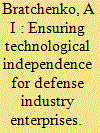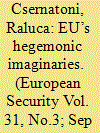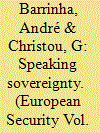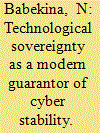| Srl | Item |
| 1 |
ID:
161913


|
|
|
|
|
| Summary/Abstract |
This paper looks at the prospects of tackling key problems of import substitution in the area of information and communication technologies in Russia's defense industrial complex as the basis for ensuring this country's technological sovereignty. The authors suggest a formula of import substitution that is relevant to the defense industry, given the priorities of science-and-technology trends, and quantitative assessment of the degree of trust as a comprehensive indicator of security and technological independence of firmware.
|
|
|
|
|
|
|
|
|
|
|
|
|
|
|
|
| 2 |
ID:
187079


|
|
|
|
|
| Summary/Abstract |
Discourses around “strategic autonomy” and “sovereignty”, traditionally used at the state level, have been recently circulated within the EU supranational context regarding the European defence technological and industrial base, dual-use and disruptive research and innovation, and advances in the tech and digital domains. This article explores whether a high-politics logic intrinsic to “strategic autonomy” and “sovereignty” has been transplanted at the EU-level to enhance the strategic priority of various lower-politics policy fields across tech and digital policy initiatives and instruments. This logic has the hegemonic effect of shaping collective thinking and opening windows of opportunity for EU policymaking, by mainstreaming a security imaginary into broader technological governance processes. The article examines the EU’s scaled-up rhetoric around floating signifiers such as “strategic autonomy” and “technological sovereignty”, as well as the diffusion of overlapping “sovereignty” agendas enacted transversely in the defence, tech and digital sectors. The argument is that their meaning is not yet fixed but articulated via hegemonic interventions across different interconnected policy fields. This makes for conceptual “travelling” and “stretching” with a potential impact on the future of European security integration, by creating of a more unified security imaginary of the EU as a strategically independent and technologically sovereign space.
|
|
|
|
|
|
|
|
|
|
|
|
|
|
|
|
| 3 |
ID:
187077


|
|
|
|
|
| Summary/Abstract |
The EU’s revised Cybersecurity Strategy (2020) has been constructed in the context of increasing geopolitical tension and within a dynamically evolving technological environment. The onset of new technologies has brought with it new opportunities but also perceived risks and threats in cyberspace, to which the EU has sought to elicit a more comprehensive approach underpinned by a move to become more “technologically sovereign”. We seek in this article to critically unpack what such claims to technological sovereignty mean for the EU in the cyber domain and what the practical implications are of the EU taking ownership of and performing sovereignty. More specifically, in seeking to conceptually unpack technological sovereignty in its internal and external manifestations, we show how its articulation, legitimisation and operationalisation has implications and consequences for the EU’s identity and action in the cyber domain.
|
|
|
|
|
|
|
|
|
|
|
|
|
|
|
|
| 4 |
ID:
189784


|
|
|
|
|
| Summary/Abstract |
OVER the past few years, we have been increasingly hearing the term "technological sovereignty." It is not only discussed at Russian domestic venues but has also become a key issue on the international agenda. The significance and relevance of this issue are undeniable: Every day we witness and participate in the creation of a fundamentally new paradigm that is shaping the modern political and economic world order. We face new challenges and threats, and in countering these difficulties, we continue to gain more and more opportunities to realize our country's potential. The domestic market and foreign economic relations are transforming rapidly and adapting to pervasive new realities.
|
|
|
|
|
|
|
|
|
|
|
|
|
|
|
|